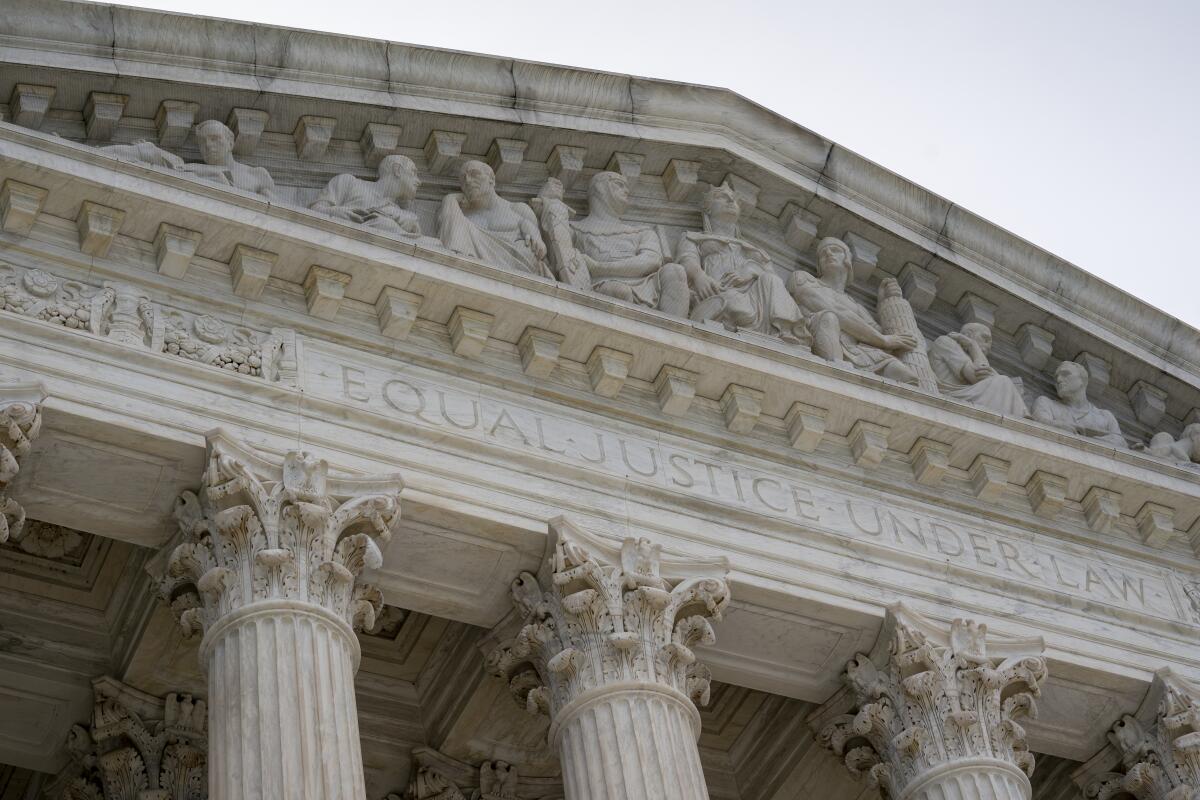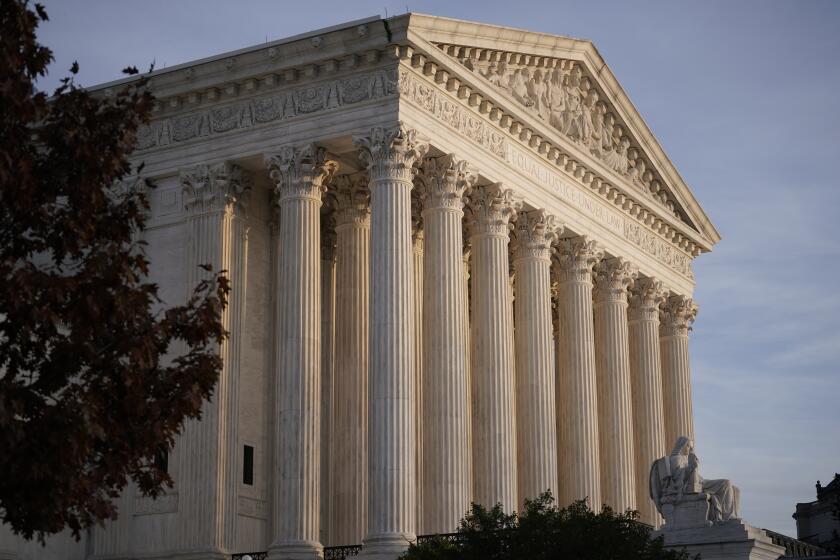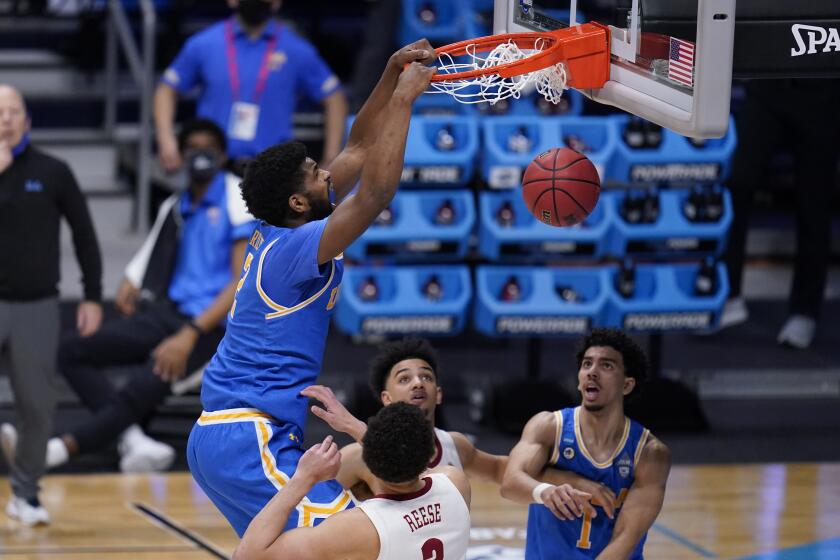Conservative justices dunk on NCAA amateurism rules, but they still might protect them

- Share via
The day after the Final Four was set, helping the NCAA refill its pandemic-plagued coffers, here’s how college sports’ governing body showed its appreciation to the thousands of players who sacrificed to compete during a season shaped by COVID-19:
It argued before the Supreme Court Wednesday the key to keeping the whole enterprise afloat was supporting schools’ ability to continue capping athletes’ compensation — even limits on extra benefits that are related to education. Those limits were struck down last year by the Ninth Circuit U.S. Court of Appeal in response to Alston v. NCAA.
The NCAA appealed to the highest court in the land stating it feared schools would abuse the definition of education-related tools, internships and various academic opportunities to provide athletes the equivalent of “pay for play,” further fracturing the amateur ideal.
The NCAA’s hope is that the Court will rule (sometime in June or July is the expectation) that lower courts overstepped their role in interpreting antitrust law and reverse the decision, keeping iPads out of the hands of college football and men’s basketball players who annually bring in tens of millions of dollars in media rights payments to their schools.
This is how the NCAA conducts business now, blowing much of what money the athletes net them on lawyers’ fees to make sure the schools can continue to control exactly how much of the windfall goes back into the players’ pockets.
The NCAA, under pressure from dozens of state legislatures that passed bills granting athletes the rights to profit from their name, image and likeness (NIL), had already thrown a lifeline to Capitol Hill asking for a federal solution. When the association made that play, the Republicans controlled the Senate and the assumption was lawmakers would place a tidy bow around the issue for the schools to essentially keep the status quo. NIL is now in the hands of a Democratic majority, led by senators who are passionately pushing for broader reform that greatly favors athletes.
The Supreme Court, with six conservative justices out of nine, seemed like a final chance to protect the NCAA’s definition of amateurism.
So it must have come as quite a shock Wednesday morning when some of the most conservative justices on the bench began to thunderously dunk on the NCAA.
Current NCAA rules cap the scholarship money colleges can offer athletes. If the Supreme Court sides with former students, those caps could go away.
“I start from the idea that the antitrust laws should not be a cover for exploitation of the student-athletes, so that is a concern, an overarching concern here,” Justice Brett Kavanaugh began in his questioning of NCAA attorney Seth Waxman.
“It does seem … that schools are agreeing with competitors to pay no salaries to the workers who are making the schools billions of dollars on the theory that consumers want the schools to pay their workers nothing. And that just seems entirely circular and even somewhat disturbing.”
The NCAA’s argument is that you, the fan, will not be as interested in college sports as a product if athletes are allowed to receive anything beyond the minimum costs of an education. The data collected in a survey by the plaintiffs’ attorneys in the Alston case says otherwise, and so does a history that shows every time the NCAA has been forced to remove a restraint, it has not affected college sports’ popularity.
Justice Clarence Thomas, another conservative, poked at the NCAA’s argument.
“Is there a similar focus on the compensation of coaches to maintain that distinction between amateur coaches as opposed to coaches in the pro ranks?” Thomas asked.
Waxman told Thomas the NCAA previously had a rule limiting compensation for certain coaches, a rule struck down in 1998 by the Tenth Circuit in Law v. NCAA.
“Coaches are not student-athletes,” Waxman said of the ruling’s rationale. “They are professionals, just like professors and presidents.”
“Well,” Thomas responded, “it just strikes me as odd that the coaches’ salaries have ballooned and they’re in the amateur ranks, as are the players.”
Later, Waxman alluded to the question, saying, “We know what happened to college coaches’ salaries when the court struck down the NCAA’s rules limiting those salaries. They went through the roof.”
Exactly.
Of course market forces would do the same for the players, which the NCAA argues would be a detriment to consumers.
“But the athletes themselves have a pretty hard life,” said Justice Samuel Alito, another conservative on the bench. “They face training requirements that leave little time or energy for study, constant pressure to put sports above study, pressure to drop out of hard majors and hard classes, really shockingly low graduation rates. Only a tiny percentage ever go on to make any money in professional sports.
“So the argument is, they are recruited, they’re used up, and then they’re cast aside without even a college degree. So they say, how can this be defended in the name of amateurism?”
Waxman said that’s a debate that should be taken up by federal lawmakers, not justices evaluating antitrust merits of this case.
“You say that what’s distinctive about your product is that your players are not paid,” Alito continued. “And that was true a hundred years ago. But, in fact, they are paid. They get lower admission standards. They get tuition, room and board, and other things. That’s a form of pay. So the distinction is not whether they’re going to be paid. It’s the form in which they’re going to be paid, isn’t that right?”
And then came Amy Coney Barrett, the newest conservative judge: “[Waxman] said it’s not pay because the NCAA has defined ‘pay’ as the reasonable and necessary expenses to obtain education. But I’m wondering, why does the NCAA get to define what pay is?”
On the other side, while conservatives expressed some of the most vehement criticism of the NCAA, liberal justices seemed surprisingly hesitant to rock the amateurism boat.
“The reason it’s so tough for me is because this is not an ordinary product,” said Justice Stephen Breyer, a liberal. “This is an effort to bring into the world something that’s brought joy and all kinds of things to millions and millions of people, and it’s only partly economic. OK? So I worry about judges getting into the business of deciding how amateur sports should be run.”
Justice Sonia Sotomayor followed by asking, “How do we know that we’re not just destroying the game as it exists? Meaning we’re being told by Mr. Waxman that all these education-related payments can become extravagant and, as a result, be viewed by the public as pay for play. … How do we ensure that doesn’t happen?”
TBS ended Fox News Channel’s eight-week streak of finishing first among cable networks with coverage of the NCAA tournament.
The justices expressed concern that affirming the plaintiffs’ win in Alston will just lead to more litigation against the NCAA and more removing of restraints until the quality that supposedly differentiates the product — that the players are not paid to play — goes away entirely.
We don’t know how the justices will weigh their shared disdain for the NCAA’s business model against their hesitation to get in the middle of it.
There was enough skepticism from conservatives Wednesday that the NCAA should at least feel nervous the Court will not only affirm Alston but issue a new dicta — a judicial opinion that arises in the ruling but doesn’t relate directly to the case at hand — that harms the future of amateurism far beyond.
For reference, a dicta from the NCAA v. Board of Regents of the University of Oklahoma case in the 1980s that helped the NCAA argue for amateurism in antitrust cases like O’Bannon v. NCAA. The case struck down the NCAA’s monopoly on deciding which games would be broadcast on TV, giving power to the conferences and schools to sell their content to the highest bidder, but within that ruling, the Court asserted that college athletes “must not be paid.” Alston attorneys have argued that is dicta, which means it should not guide current Court decisions.
The NCAA advantage could be eliminated based on whatever the Court decides in the Alston case. Backed against the wall, with all corners closing in, it was a risk the NCAA was willing to take. But there’s a possibility its schools will now be left more exposed.
More to Read
Go beyond the scoreboard
Get the latest on L.A.'s teams in the daily Sports Report newsletter.
You may occasionally receive promotional content from the Los Angeles Times.













